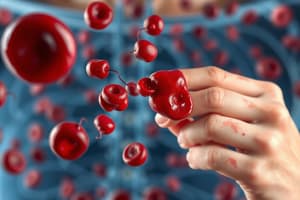Podcast
Questions and Answers
Which symptom is commonly associated with primary haemostatic disorders?
Which symptom is commonly associated with primary haemostatic disorders?
- Epistaxes (correct)
- Intramuscular haematomas
- Prolonged bleeding time
- Haemarthroses
What is a distinguishing feature of secondary haemostatic disorders?
What is a distinguishing feature of secondary haemostatic disorders?
- Haemarthroses occurs commonly (correct)
- Bleeding is immediate
- Gender distribution is equal
- Petechiae are common
Which condition is characterized by a platelet count below 150 x 10^9/L?
Which condition is characterized by a platelet count below 150 x 10^9/L?
- Thrombocytopenia (correct)
- Leukopenia
- Thrombocytosis
- Normal platelet count
Which of the following is NOT a common symptom of primary haemostatic disorders?
Which of the following is NOT a common symptom of primary haemostatic disorders?
In which gender is secondary haemostatic disorders more prevalent?
In which gender is secondary haemostatic disorders more prevalent?
Flashcards are hidden until you start studying
Study Notes
Primary Haemostatic Disorder
- Characterized by thrombocytopenia and von Willebrand disease (VWD).
- Immediate bleeding occurs upon injury.
- Common symptoms include:
- Petechiae: small, red or purple spots caused by bleeding under the skin.
- Epistaxis: frequent nosebleeds.
- Menorrhagia: heavy menstrual bleeding.
- Haemarthroses (joint bleeding) do not occur.
- Intramuscular hematomas are uncommon.
- Gender distribution is equal, affecting both sexes similarly.
Coagulation Disorder (Secondary Haemostatic Disorders)
- Primarily associated with hemophilia.
- Delayed bleeding occurs after injury.
- Symptoms vary:
- No petechiae present.
- Epistaxis is not commonly reported.
- Menorrhagia is not frequently observed.
- Haemarthroses occur commonly, leading to bleeding into joints.
- Intramuscular hematomas are a common finding.
- More than 80% of cases are found in males.
Causes of Bleeding Defects
- Vascular defects: weak vessels that leak blood.
- Decreased platelet number: condition known as thrombocytopenia.
- Decreased platelet function.
- Decreased coagulation factors in the blood.
Thrombocytes (Platelets)
- Also referred to as platelets, essential for blood clotting.
- Normal platelet count ranges from 150 to 400 x 10^9/L.
Thrombocytopenia
- Defined as a condition with a low platelet count, significantly below the normal range.
Studying That Suits You
Use AI to generate personalized quizzes and flashcards to suit your learning preferences.




